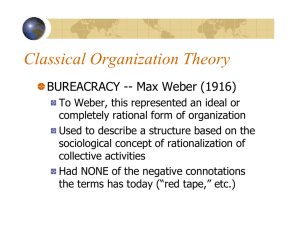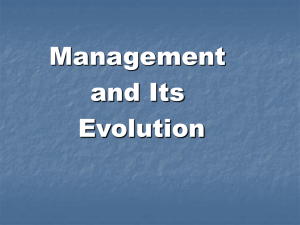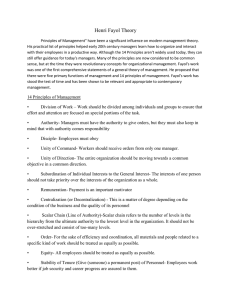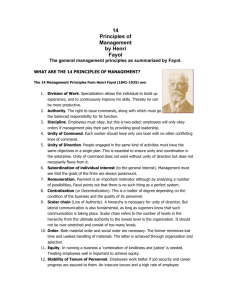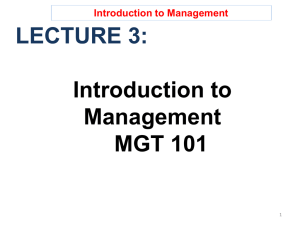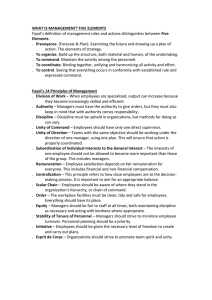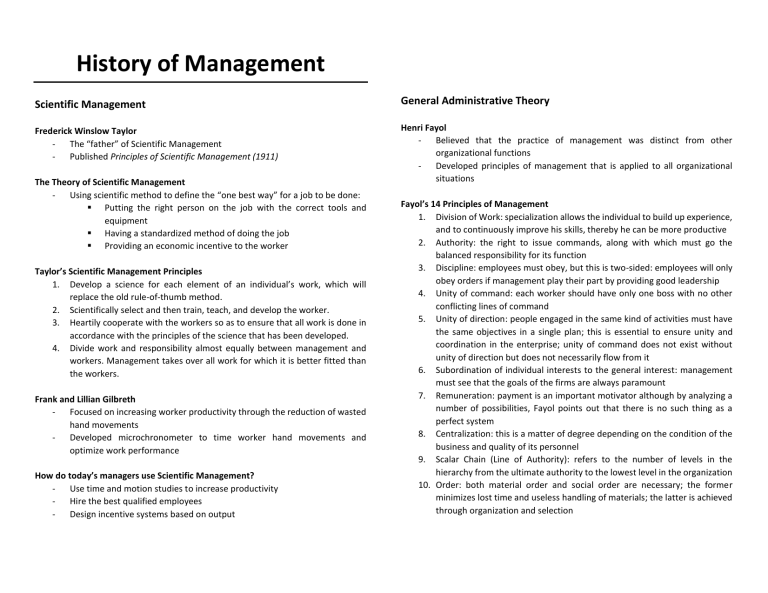
History of Management Scientific Management General Administrative Theory Frederick Winslow Taylor The “father” of Scientific Management Published Principles of Scientific Management (1911) Henri Fayol Believed that the practice of management was distinct from other organizational functions Developed principles of management that is applied to all organizational situations The Theory of Scientific Management Using scientific method to define the “one best way” for a job to be done: ▪ Putting the right person on the job with the correct tools and equipment ▪ Having a standardized method of doing the job ▪ Providing an economic incentive to the worker Taylor’s Scientific Management Principles 1. Develop a science for each element of an individual’s work, which will replace the old rule-of-thumb method. 2. Scientifically select and then train, teach, and develop the worker. 3. Heartily cooperate with the workers so as to ensure that all work is done in accordance with the principles of the science that has been developed. 4. Divide work and responsibility almost equally between management and workers. Management takes over all work for which it is better fitted than the workers. Frank and Lillian Gilbreth Focused on increasing worker productivity through the reduction of wasted hand movements Developed microchronometer to time worker hand movements and optimize work performance How do today’s managers use Scientific Management? Use time and motion studies to increase productivity Hire the best qualified employees Design incentive systems based on output Fayol’s 14 Principles of Management 1. Division of Work: specialization allows the individual to build up experience, and to continuously improve his skills, thereby he can be more productive 2. Authority: the right to issue commands, along with which must go the balanced responsibility for its function 3. Discipline: employees must obey, but this is two-sided: employees will only obey orders if management play their part by providing good leadership 4. Unity of command: each worker should have only one boss with no other conflicting lines of command 5. Unity of direction: people engaged in the same kind of activities must have the same objectives in a single plan; this is essential to ensure unity and coordination in the enterprise; unity of command does not exist without unity of direction but does not necessarily flow from it 6. Subordination of individual interests to the general interest: management must see that the goals of the firms are always paramount 7. Remuneration: payment is an important motivator although by analyzing a number of possibilities, Fayol points out that there is no such thing as a perfect system 8. Centralization: this is a matter of degree depending on the condition of the business and quality of its personnel 9. Scalar Chain (Line of Authority): refers to the number of levels in the hierarchy from the ultimate authority to the lowest level in the organization 10. Order: both material order and social order are necessary; the former minimizes lost time and useless handling of materials; the latter is achieved through organization and selection 11. Equity: in running a business, a combination of kindliness and justice is needed; treating employees well is important to achieve equity 12. Stability of Tenure of Personnel: employees work better if job security and career progress are assured to them; an insecure tenure and a high rate of employee turnover will affect the organization adversely 13. Initiative: allowing all personnel to show their initiative in some way is a source of strength for the organization; even though it may well involve a sacrifice of personal vanity on the part of many managers 14. Esprit de Corps: management must foster the morale of its employees; he further suggests that “real talent is needed to coordinate effort, encourage kindness, use each person’s abilities, and reward each one’s merit without arousing possible jealousies and disturbing harmonious relations” Max Weber Developed a theory of authority based on an ideal type of organization (bureaucracy) ▪ Emphasized rationality, predictability, impersonality, technical competence, and authoritarianism Weber’s Bureaucracy 1. Authority Hierarchy: positions organized in a hierarchy with a clear chain of command 2. Formal Selection: people selected for jobs based on technical qualifications 3. Formal Rules and Regulations: system of written rules and standard operating procedures 4. Impersonality: uniform application of rules and controls, not according to personalities 5. Career Orientation: managers are career professionals, not owners of units they manage 6. Division of Labor: jobs broken down into simple, routine, and well-defined tasks
